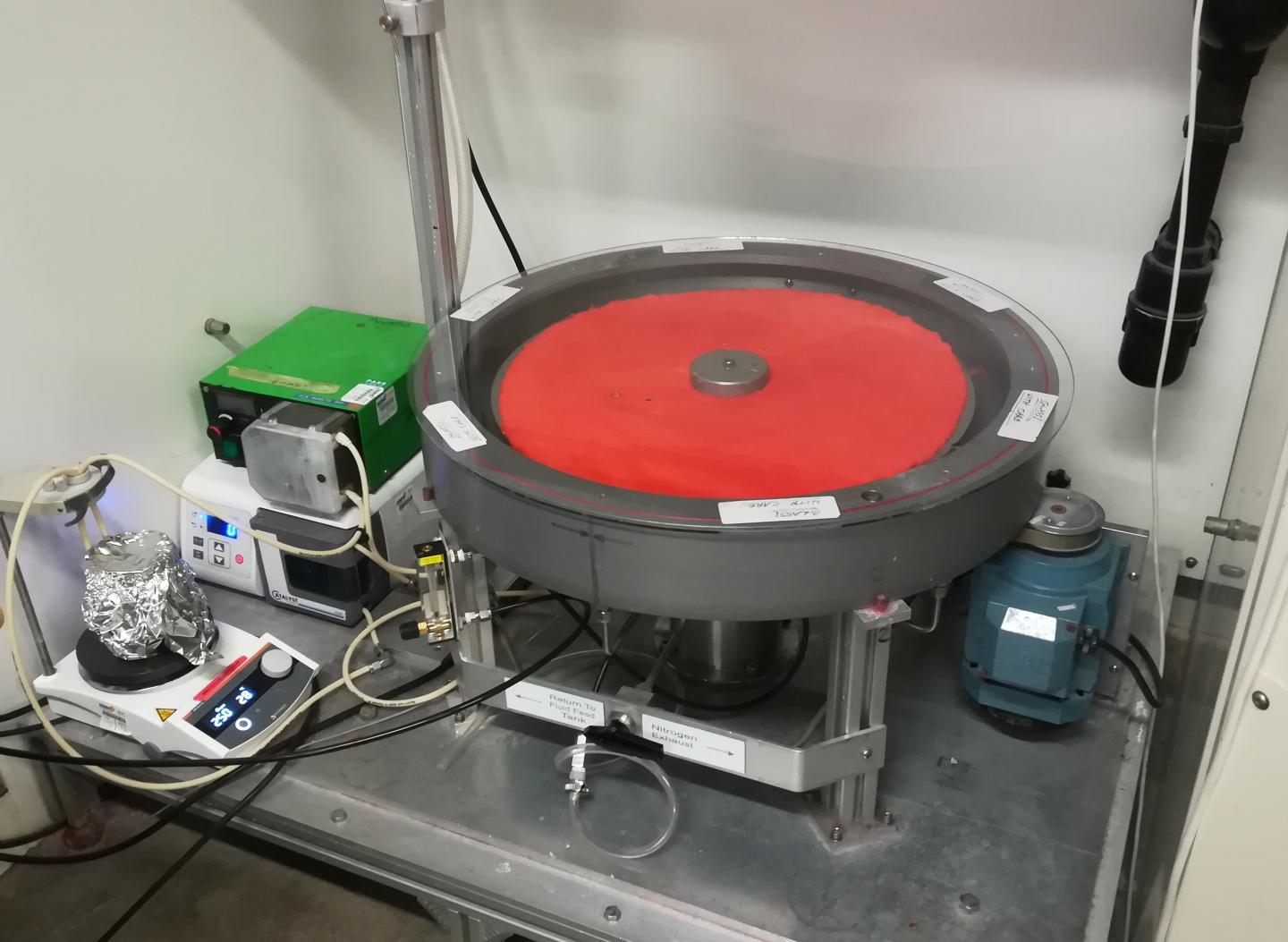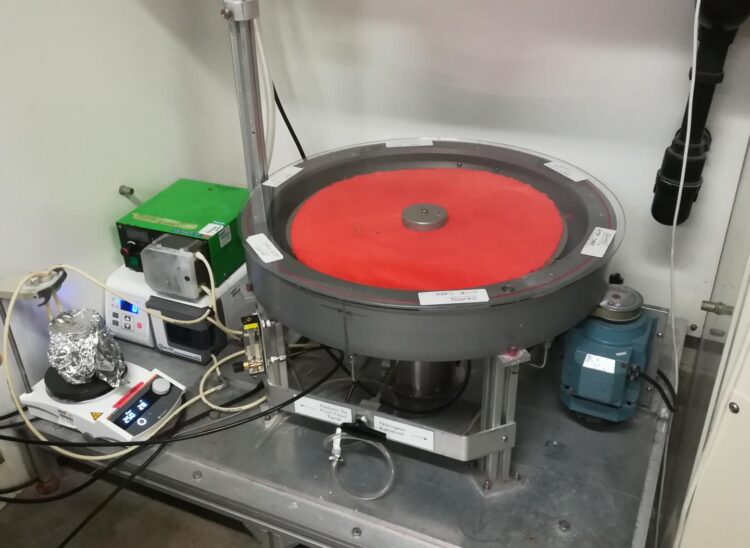Spinning Disc Mesh Reactor developed by Bath chemical engineers could make pharmaceuticals production safer and more sustainable

Credit: University of Bath
- All-female research team wins funding from Innovate UK to commercialise new chemical reactor
- The Spinning Mesh Disc Reactor works like a vinyl record player, allowing fast, low-cost and sustainable creation of chemicals and compounds
- Reactor could make chemical producers more flexible and responsive to emerging health issues such as pandemics
A new catalytic reactor that can create chemical compounds more quickly, cheaply and in a more sustainable way has won funding from Innovate UK.
The Spinning Disc Mesh Reactor (SMDR), developed by University of Bath chemical engineers Dr Emma Emanuelsson-Patterson and Dr Parimala Shivaprasad, creates chemicals and APIs – Active Pharmaceutical Ingredients, used to create all sorts of medicines – by reacting chemicals with enzymes on a spinning cloth-covered plate, like a vinyl record.
The pair’s company, SMDR Ltd, has won funding from Innovate UK to commercialise the reactor and market it to pharmaceutical companies following its 12-year development.
The SMDR creates chemicals by imitating the action of a record player: an enzyme applied to a woollen cloth disc is spun on a turntable, where it reacts with a chemical substrate, creating the desired compound or API.
The Emanuelsson research group has shown that using a cloth disc protects the enzymes from denaturing or shearing, which renders them unusable, and allows optimal contact between the enzyme catalyst and the substrate, which ensures fast reactions. This means the catalyst cloth disc can be used for far longer, making the process cheaper and more sustainable than traditional reactors.
Dr Emanuelsson-Patterson says: “The basic principle of the SMDR is using the centrifugal forces generated by rotation to create a very consistent and repeatable reaction. Chemical engineers strive to enhance this kind of ‘mass transfer’ as it produces faster reactions, and in our case more chemicals or APIs.”
Dr Shivaprasad adds: “One of the main advantages of the SMDR essentially works a little bit like a jukebox that can switch between records. Using the catalyst cloth mesh discs, which can be swapped easily and quickly, means we can apply a range of different reagents or catalysts rapidly, creating a wide range of chemicals or APIs.”
Explaining the need for better efficiency, Dr Emanuelsson-Patterson said: “Reagents and enzymes are expensive and also very sensitive to how they’re handled, particularly with regard to shearing (or tearing) forces. Using the mesh disc and harnessing centrifugal forces means we’ve significantly reduced these risks, giving more potential to safely reuse them. This has benefits in efficiency, cost and sustainability.”
The disc design also creates potential for improving the efficiency of chemical production – catalysts can be switched in and out quickly, creating flexibility and scope for batch production. One exciting challenge the team will investigate is how the SMDR could run several different reactions, using multiple catalysts at the same time.
Dr Shivaprasad was a part of the three-month ICURe programme to carry out the market analysis for the SMDR. The main objective was to identify the current challenges in chemical manufacturing and if the SMDR had the potential to alleviate these challenges to improve processing efficiency in chemical industries.
“We found that there was a market need among pharmaceutical intermediaries – the companies that supply APIs, the ingredients that go into drugs or products – for faster, more sustainable production options,” she says.
The next steps for Dr Emanuelsson-Patterson and Dr Shivaprasad include the optimisation of multi-disc ‘scale-up’ reactor, the MD-SMDR, on pilot scale and doing a cost analysis. They hope that its cost-effectiveness and flexibility will provide a pathway for local production of APIs and chemicals, reducing the reliance on complex supply chains, which has proven an issue in some countries during the coronavirus pandemic.
The MD-SMDR, is designed based on a modular concept having a single shaft with numerous discs, each of which would be stackable. This will create flexibility both in the quantities and types of chemicals produced.
The project has received £68,500 in funding from Innovate UK Sustainable Funding Round 2, a part of UK Research and Innovation.
Dr Ian Campbell, interim Executive Chair for Innovate UK, said: “In these difficult times, we have seen the best of British business innovation. The pandemic is not just a health emergency but one that impacts society and the economy.
“SMDR Ltd, along with every initiative Innovate UK has supported through this fund, is an important step forward in driving sustainable economic development. Each one is also helping to realise the ambitions of hard-working people.”
###
Notes
For more information or to arrange interviews, contact Will McManus on [email protected] or +44(0)1225 385 798.
Images are available at: https:/
University of Bath
The University of Bath is one of the UK’s leading universities both in terms of research and our reputation for excellence in teaching, learning and graduate prospects.
The University is rated Gold in the Teaching Excellence Framework (TEF), the Government’s assessment of teaching quality in universities, meaning its teaching is of the highest quality in the UK.
In the Research Excellence Framework (REF) 2014 research assessment 87 percent of our research was defined as ‘world-leading’ or ‘internationally excellent’. From developing fuel efficient cars of the future, to identifying infectious diseases more quickly, or working to improve the lives of female farmers in West Africa, research from Bath is making a difference around the world. Find out more: http://www.
Well established as a nurturing environment for enterprising minds, Bath is a top ten university in all national league tables. We are ranked 6th in the UK by The Guardian University Guide 2021, 9th in The Times & Sunday Times Good University Guide 2021, and 9th out of 131 UK universities in the Complete University Guide 2021.
Media Contact
Will McManus
[email protected]





